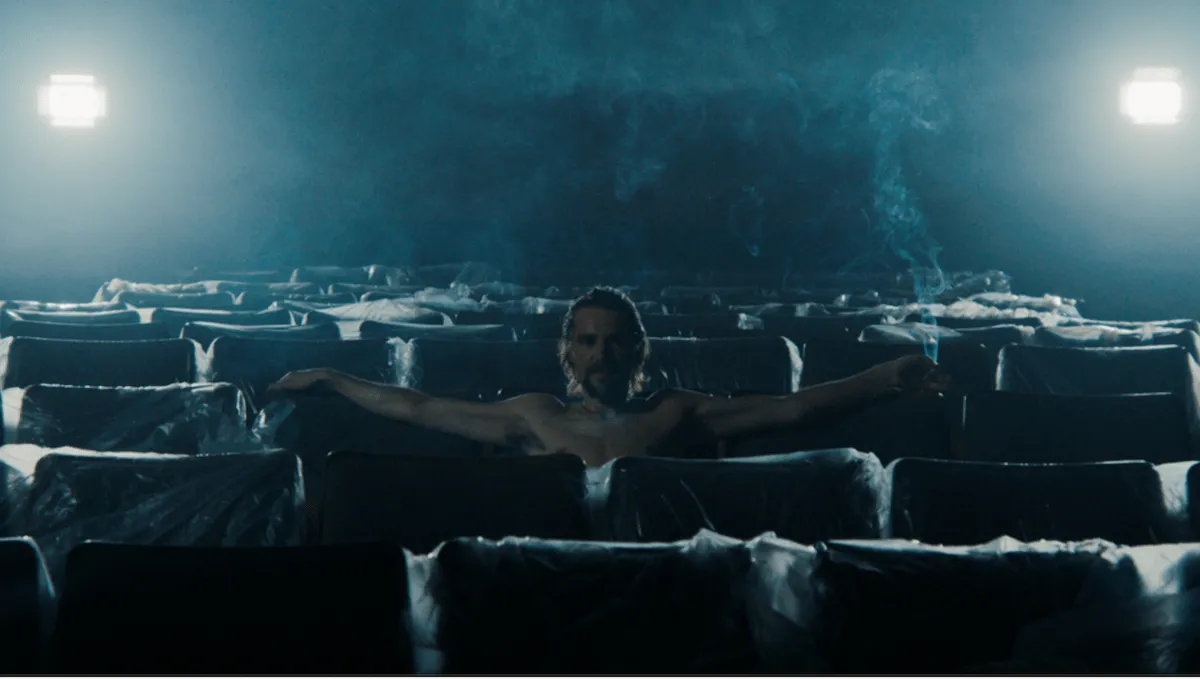Alex Clark is a renowned photographer embarking on a solitary journey through the bleak desert landscapes of the American Southwest. Well known for his striking photos capturing abandoned buildings taken over by nature, Alex hopes to recapture the fire of his early career and rekindle his passion for photography.
Now middle-aged with his creative spark feeling faded, he leaves behind technology to let his wanderings get lost in nature’s reclamation of what remains after civilization’s fleeting presence.
Directed and co-written by Joshua Erkman in his feature debut, A Desert blends elements of neo-noir and psychological horrorfilm to explore Alex’s literal and metaphorical voyage. Erkman deftly guides leading man Kai Lennox’s compelling performance as the isolated artist searching for meaning through his craft.
While calling wife Sarah Lind each night for comfort, Alex finds himself drawn into growing darkness amid the film’s decayed yet strangely beautiful Southwestern locations. Captured through cinematographer Jay Keitel’s unflinching lens, this is a lonely road trip into the unsettling heart of darkness lurking beneath the surface of the American Dream.
The Lonely Souls of A Desert
At the center of A Desert is Alex Clark, a renowned photographer drifting through life almost as aimlessly as he roams the barren Southwest landscape. Years have passed since his acclaimed early work capturing ruin unseen by modern eyes, and now a midlife crisis forces him to reevaluate. He leaves the comforts of home and technology, hoping isolation will rekindle the spark within through rediscovering sights no camera has found.
Ever supportive despite hardships, wife Sam shows unwavering belief in Alex even when doubts creep in. Her fierce love and care provide the connection keeping Alex tethered as he floats untethered. But living half a country apart stretches their bond to its limits in this lonely, unforgiving desert where evil can emerge anywhere.
It’s in this parched wasteland that Alex encounters the volatile Renny and mysterious Suzie Q, souls as dry and unpredictable as the dust kicking on barren roads. On the surface, a threatening pair, they conceal wounds of the past that drive complexity within volatility. Renny sees in Alex something lacking in himself—an artist’s eye longing to witness darkness’s raw beauty rather than experience its touch.
Into this twisted tableau comes damaged P.I. Harold, whose corrupt past clings like any other desert ghost. Though battered, he retains flickers of light within darkness through wry humor and wariness born of surviving shadows where others didn’t. Tasked with unearthing long-buried truths, Harold experiences a psycho-spiritual reckoning as much as an investigation.
Each lonely soul searches for meaning wrested from emptiness, whether through art, faith in loved ones, confronting harsh realities, or escaping them. In A Desert’s blistering landscape, their lives intersect; fates twist together, rising from the ruins of the American Dream, each thought abandoned, yet some hold, hoping to find beauty in barrenness.
Loneliness and Decay in the American Wasteland
Joshua Erkman imbues his debut film A Desert with profound themes of loneliness, alienation, and humanity’s relationship with the ravages of time. Central to the neo-noir psychological horror is a pervading sense of isolation haunting its characters like a desert mirage.
Renowned photographer Alex embarks on a solitary journey through the bleak Southwest, pursuing artistic renewal in nature’s reclamation of the abandoned. His calls home to Sam reflect a growing solitude exacerbated by physical distance from his wife. As Alex delves deeper into remote landscapes, he taps into a deeper loneliness surrounding his career’s stagnation and his place in the world.
The desolate towns Alex captures in photos mirror the decay within. Dilapidated structures left to nature’s whims evoke nostalgia for vibrant eras now gone and the lingering spirits who once inhabited these ruins. Even Renny and Suzie, plagued by turmoil in their relationship, seek fleeting human connection to fight perpetual isolation within their criminal livelihoods.
The corrupted P.I. Harold acts as a symbol for morality’s corrosion, having traded ethics for vices that further distance him from society. His disillusionment reflects the moral stagnation he uncovers festering beneath the American veneer.
Throughout, Erkman uses the crumbling Southwest as a metaphor for lives falling apart. The abandoned ghost towns feel haunted by past dreams now lost, much like the characters drifting without purpose. Their fractured bonds enhance overarching themes of brokenness and corrosion, eroding optimism for the future.
In A Desert’s chilling portrait of individuals precariously clinging to fleeting moments of purpose in an arbitrary world, Erkman elevates existential isolation and decay into profound commentary on human nature tested by the modern condition. His subtly philosophical novel proves darkness can emerge anywhere amid life’s quiet ruination.
Capturing Decay on Camera
Joshua Erkman wields the cinematic tools of mise-en-scène to plunge viewers into the bleak, unnerving world of A Desert. Working with acclaimed cinematographer Jay Keitel, who lends experience from gripping fare like She Dies Tomorrow, Erkman crafts an unflinching visual style perfectly matching the psychological thriller’s ominous undertones.
Every frame brims with the sun-bleached desolation of the Southwest. Dilapidated ghost towns serve as backdrops, revealing mankind’s fleeting hold as nature retakes what was once built. Crumbling infrastructure reflects the internal decay haunting characters lost in the wasteland’s vast expanses. Erkman lingers in these settings, soaking in textures of rotting wood and chipped paint that permeate the rural dystopia.
A palette devoid of lush color instead ushers viewers into a tawny, tension-filled realm. Bleached natural browns and oranges saturate each shot, muting life’s vibrancy to stone-cold hues matching personalities chilled by solitude. Contrasting crisply within this monochrome landscape, slashes of hellish red bleed through when violence emerges, intensifying the stomach-dropping impact.
Compositions frame characters as lonely ant figures dwarfed by surroundings, emphasizing their smallness against nature’s indifference. Close-ups burrow into eyes, giving window to their fractured psyches, showing desperation arising when hope fades like the crumbling walls around them. As Alex snaps photos, audiences peer through his lens at America laying in ruin.
This mastery of visual storytelling imbues even mundane imagery with unsettling subtext. From telephone wires sagging limp in the distance to rusted hotel signs decaying under the punishing sun, Erkman and Keitel imbue everyday detritus with ominous undertones that stir dim fears just below the surface. In A Desert’s capable hands, landscapes become ominous mindscapes reflecting inner turmoil, breaking characters down until nothing is left.
Unpredictable Journeys Through the Wasteland
As A Desert opens, photographer Alex Clark embarks on a solitary expedition across the barren Southwest landscape. Hoping to reignite his passion, he leaves behind technology to wander aimlessly, snapping haunting shots of places reclaimed by nature. Each night he checks into rundown motels, calling wife Sam with tales of deserted ruins.
When noises disrupt sleep in a seedy inn, Alex’s complaint brings confrontations with volatile Renny and mysterious Suzie Q. Intuition pounds alarms, yet theircharm proves disarming. Against better judgement, Alex accepts an invitation that leads to regrettable choices with unforeseen consequences.
As days pass without word, Sam’s worry escalates. Hiring stoic detective Harold to investigate, he traces Alex’s journey, encountering the very characters who now cannot be found. Harold’s tenacious search stalls amid mounting turmoil, shifting the focus to Sam taking matters into her hands.
Crafted by Erkman and Baker, the nonlinear narrative resists predictability. unexpected swerves continually upend expectations just when safety seems found. Perspective jumps amid chaos, expanding the central mystery beyond any single character while miring all further into uncertain horrors.
Without easy answers dangled, viewers must join this haunting ride into the unknown. Erkman invites being lost amid his dreamlike Southwestern dystopia, where shifting sands swallow what was once familiar. Doomed protagonists grasp for understanding that remains beyond reach, much like the elusive truths distorting all they hold dear in this unforgiving wasteland.
Dark Illuminations in the Desert Wasteland
Whether viewers embrace its bleakness or feel overwhelmed, Joshua Erkman’s debut, A Desert undeniably transports audiences to terrain unlike anything encountered before. This raw, unsettling neo-noir psychological thriller plunges headlong into the desolate unknown, privileging moral ambiguity over pat resolutions as characters drift farther from humanity’s grasp.
Erkman welcomes being lost in his dreamlike Southwestern nightmare, refusing easy paths through the thrillingly nonlinear plot. While some question where its rabbit holes lead, others appreciate the director’s confidence to relinquish control and let darkness spread organically from within. His assured command of visual and thematic nuance imbues even mundane landscapes with uncanny foreboding.
Certainly not for the faint, A Desert pushes boundaries in searing conclusions that leave no soul untouched. Yet beneath provocations lies beauty in Erkman’s unflinching eye, transforming societal wreckage into profound commentaries on human nature. He finds luminous majesty in life’s shadows, elevating dreariness into something poetically philosophical.
Through his distinct fusion of genres with unnerving precision, Erkman establishes himself as a formidable talent. In A Desert’s desolate yet deeply haunting wasteland, viewers glimpse only a small slice of the imaginative desolations this original visionary promises to unveil.
The Review
A Desert
While not for those seeking comfort or safety, A Desert delivers a profound cinematic experience for open-minded adventurers. Erkman's assured directorial debut crafts a memorably unsettling psychological thriller through its bleak yet thoughtful contemplations on human nature.
PROS
- Compelling character-driven narrative with great performances
- Striking visual style and atmosphere that enhances psychological horror
- Thought-provoking exploration of themes like alienation and moral decay
- Stylish fusion of genres into a uniquely unnerving thriller
- Confidently crafted plot with surprising nonlinear twists
CONS
- May be too bleak and nihilistic for some viewers' tastes.
- Opens many plot threads and mysteries left purposefully unanswered
- Middle section could potentially benefit from tighter pacing.


















































Discussion about this post